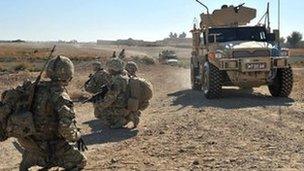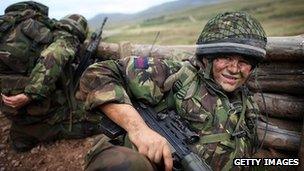MoD tries to make best of limited finances
- Published

Reservists have served successfully alongside their regular counterparts in Iraq and Afghanistan
The Ministry of Defence and the Army have both invested much time and energy working out how to make the best of a difficult financial situation.
The decision to cut the regular Army by a total of 20,000 was taken in the defence review of 2010 and a subsequent review in 2011, known as "the three-month exercise".
It has meant that the UK's Army Reserve, currently known as the Territorial Army, will need to be capable of taking on a greater role and integrating more fully with the regular force by 2020 - if all goes to plan.
The hope, perhaps, is that shedding the old name will help change perceptions as the reserves start their planned transformation.
A reserves review in 2010, with contributions from former SAS commanders Lt Gen Graeme Lamb and Lt Col Richard Williams - both now retired from the regular Army - recommended that the UK should follow nations such as the US in increasing its reliance on reserves.
The recommendation was met with some hostility by many regular service personnel, who criticised the creation of "an Army on the cheap".
But Defence Secretary Philip Hammond has made clear that the move is a result of the need to save money as austerity measures bite across Whitehall.
Both Mr Hammond and the prime minister have emphasised that the armed forces cannot be immune from the cuts.
The plans are ambitious and will require a change not just in the structure of the Army but also in the UK's attitudes to its reservists - not least the attitude of local communities and employers, whose support in this will be vital.
Immense challenges
The government will offer financial incentives to smaller businesses to encourage them to allow staff to join up.
But the recession means some may remain reluctant to employ staff who will need to spend more time in training and could be mobilised for at least one year in every five.

Those being made redundant from the regular Army are being encouraged to join the Army Reserve
The Army faces immense challenges.
It is having to conduct operations in Afghanistan and plan the redeployment of forces and material from Helmand while getting its troops out of Germany and relocating thousands of them and their families back to the UK.
At the same time, it is shedding thousands of trained soldiers while it restructures.
Now, it also needs to recruit and train reservists alongside their regular counterparts and ensure that they too have the kit and training they need.
That could be seen as an opportunity to modernise and renew the Army for the 21st Century - or as a recipe for uncertainty and demoralisation for regulars.
Some of those being made redundant from the regular Army are being encouraged to join the Army Reserve to help with the transition and bring valuable experience of operations to the reserve units.
Regulars have had to swallow their scepticism about the changes as the Army swings into action to try to make it work.
Many acknowledge that reservists have served successfully alongside their regular counterparts in both Iraq and Afghanistan.
But others worry that, even with improved welfare provision in areas such as mental health, at least some reservists may still be more affected by their service on the frontline when they return home to civilian life.
- Published3 July 2013
- Published18 June 2013
- Published12 May 2013
- Published8 November 2012
- Published14 October 2012
- Published3 July 2013